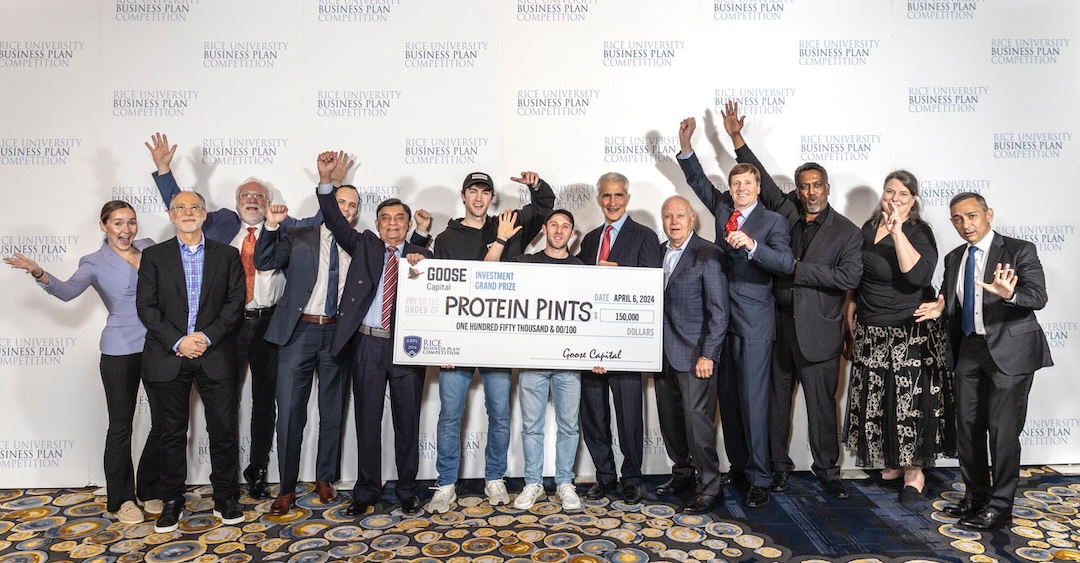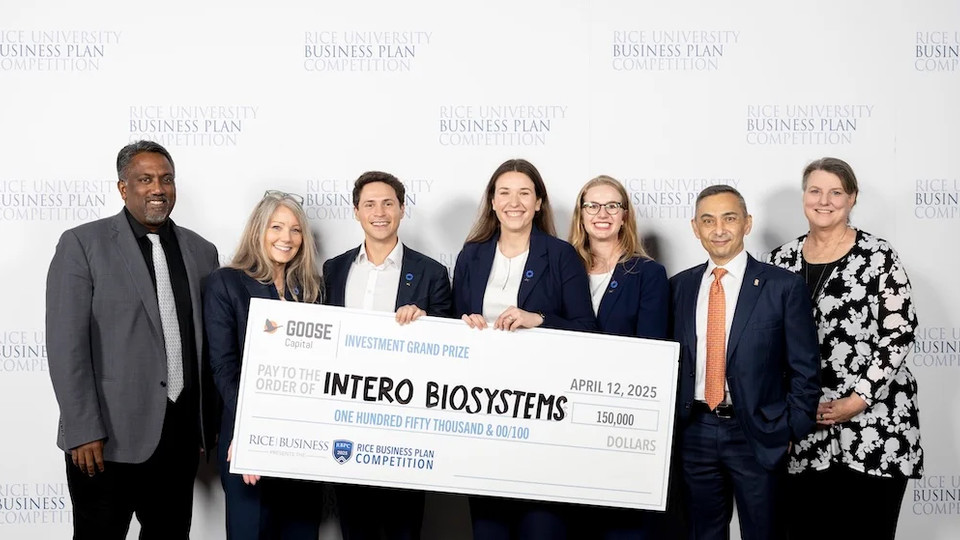
Protein ice cream company wins 2024 Rice Business Plan Competition

Rice University hosts world’s largest and richest student startup competition
Ice cream company Protein Pints took home the grand prize at the 2024 Rice Business Plan Competition (RBPC) April 6 as the best student ventures from top universities across the world competed for prizes in front of nearly 350 angel, venture capital and corporate investors and members of the business community.
During his acceptance speech, Founder and CEO of Protein Pints Paul Reiss said, “"The love and support that we've been shown during our time here at Rice, and the relationships and the friends that we've made, is something that I know I and every other student here is going to remember for the rest of our lives."
Hosted annually by the Rice Alliance for Technology and Entrepreneurship and Rice University’s Jones Graduate School of Business, the RBPC is the world’s largest and richest student startup competition.
The RBPC offers real-world opportunities to learn what’s required to successfully launch a new business. In addition to the substantial cash, investment and in-kind prizes, the heart of the competition is the mentoring from investors and experienced entrepreneurs. RBPC alumni have raised more than $6.1 billion in capital and 288 are in business or have had successful exits.
The winners were announced at the conclusion of the three-day pitching, mentoring and networking event, which included an elevator pitch competition, practice round, semifinals, wildcard and final round.
“We award the competitors $1 million in prizes, prizes that serve as foundational capital to launch their startup,” said RBPC Director Catherine Santamaria in her welcome speech at the awards gala April 6.
“That’s a large number of prizes, but the biggest thing our startups leave with is a feeling of generosity and community from this room. This community is always ready and willing to help our founders and support our vision for the competition by investing time, money and resources in these student innovators.”
The 42 competing startups represented 35 universities from four countries. They were chosen from more than 450 applicants to compete in one of five categories: energy, cleantech and sustainability; life sciences and health care solutions; consumer products and services; hard tech; and digital enterprise. Learn more about all of the startups that competed in the RBPC here.
The seven finalists based on the judges’ overall scores were:
Protein Pints, Michigan State University — first place and the $150,000 GOOSE Capital Investment Grand Prize.
- Protein Pints is a high-protein, low-sugar, ice cream product designed for people who would benefit from having access to a functional ice cream and/or better tasting and more enjoyable protein options.
Somnair, Johns Hopkins University — second place and the $100,000 Investment Prize, sponsored by David Anderson, Jon Finger, Anderson Family Fund, Finger Interests, Greg Novak and Tracy Druce.
- Somnair is a Novel Non-Invasive Neurostimulation device for the treatment of obstructive sleep apnea.
Power2Polymers, RWTH Aachen University — third place and the $50,000 Rice University investment, provided by the Rice Alliance for Technology and Entrepreneurship and sponsored by Finger Interests, the Anderson Family Fund at the Greater Houston Community Foundation, Greg Novak and Tracy Druce.
- Power2Polymers tackles the pressing issue of 'forever chemicals', which have been linked to over 6.5 million deaths in the U.S. alone, by offering safe alternatives free of forever chemicals.
Informuta, Tulane University — fourth place and the $5,000 prize, sponsored by Norton Rose Fulbright.
- Informuta's proprietary technology leverages DNA sequencing to predict if bacteria will respond to different antibiotics or, for the very first time, develop future resistance thus causing treatment failure.
Icorium Engineering Company, University of Kansas — fifth place and the $5,000 prize, sponsored by EY.
- Icorium Engineering Company is a chemical engineering startup and University of Kansas spinout developing technologies to make sustainable, circular economies a reality for refrigerants and other complex chemical mixtures.
EndoShunt Medical, Harvard University — sixth place and the $5,000 prize, sponsored by Chevron Technology Ventures.
- EndoShunt is transforming trauma surgery with a rapid, targeted blood flow control device.
D.Sole, Carnegie Mellon University — seventh place and the $5,000 prize, sponsored by Shell Ventures.
- D. Sole is advancing the development of remote patient monitoring in podiatry with foot insoles designed for the early detection and monitoring of diabetic foot complications, such as ulcers and deformities.
The fourth through seventh place startups were also awarded an additional investment prize of $25,000 each provided by Rice Alliance and sponsored by David Anderson, Jon Finger, Anderson Family Fund, Finger Interests, Greg Novak and Tracy Druce, bringing their finalist prize totals up to $30,000.
Other significant prizes this year and the teams that won them include:
- $200,000 Goose Capital Investment Prize — Osphim, RWTH Aachen University
- $250,000 OWL Investment Prizes — MesaQuantum, Harvard University
- $100,000 OWL Investment Prizes — Icorium Engineering Company, University of Kansas
- $100,000 Houston Angel Network Investment Prize — Somnair, Johns Hopkins University
- $100,000 The Indus Entrepreneurs (TiE) Texas Angels Investment Prize — Protein Pints, Michigan State University
- $60,000 nCourage Courageous Women Entrepreneur Investment Prize — MesaQuantum, Harvard University
- $40,000 nCourage Courageous Women Entrepreneur Investment Prize — Icorium Engineering Company, University of Kansas
- $40,000 Pearland EDC Spirit of Entrepreneurship Cash Prize — Informuta, Tulane University
- $25,000 New Climate Ventures Sustainable Investment Prize — Oxylus Energy, Yale University
- $25,000 Dream Big Ventures Latino Entrepreneur Investment Prize — Dendritic Health AI, Northwestern University
- $25,000 NOV Energy Technology Innovation Cash Prize — LiQuidium, University of Houston
- $25,000 Urban Capital Network Diversity Investment Prize in Partnership with South Loop Venture Investment Prize — TouchStone, University of California, Berkeley
- $25,000 Southwest National Pediatric Device Consortium Pediatric Device Cash Prize — EndoShunt Medical, Harvard University
- $25,000 Jacobs, Intuitive Machines and WRX Companies Rising Stars Space Technology and Commercial Aerospace Cash Prize — MesaQuantum, Harvard University
For more information about the 2024 Rice Business Plan Competition, visit rbpc.rice.edu.


